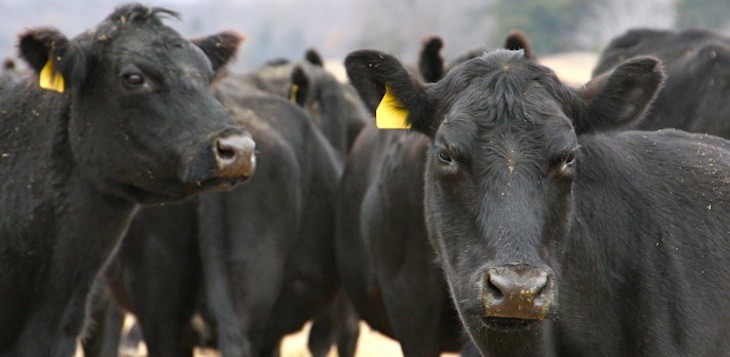Arkansas Farm Bureau boss talks NAFTA, Cuba, tariffs, and farmer security
by March 14, 2018 2:42 pm 783 views

Third-generation farmer Randy Veach is the 10th president of the Arkansas Farm Bureau since its 1935 formation. He and wife Thelma farm near Lost Cane (Mississippi County).
He recently sat down with Talk Business & Politics CEO Roby Brock to talk about NAFTA, Cuba and other aspects of opportunities for agricultural trade.
Roby Brock: From your perspective, and please feel free to use hyperbole, how critical is NAFTA to Arkansas and Northeast Arkansas farmers?
Randy Veach: NAFTA is extremely important to Arkansas agriculture. One-third of the value of farm products grown and raised here are exported to foreign markets. Canada and Mexico are our top two trading partners and the commodities we raise in Arkansas are among the most heavily traded with those countries. To say it is extremely important is not overstating things, it’s the cold, hard truth.
Brock: What’s the best part of NAFTA for Arkansas and Northeast Arkansas?
Veach: It keeps us at the front of the line for agricultural exports. Look at it this way, the U.S. exports half its rice crop and a quarter of those exports are destined to NAFTA countries. The loss of NAFTA would remove the mostly current access the U.S. currently enjoys with Mexico and Canada. But, both of those countries are still pursuing TPP, which would increase the competitiveness of Vietnamese rice in both countries and likely result in lowering U.S. market share.
Brock: What needs to be revisited, if anything? Where is the Arkansas ag community getting hurt by NAFTA?
Veach: For the most part, U.S. agriculture has free and open access to both Canada and Mexico. U.S. agricultural exports to Mexico saw all agricultural tariffs eliminated, while exports to Canada saw most agricultural tariffs removed. The only exceptions are dairy, poultry, eggs and timber products. Some of those commodities are covered by tariff-rate quotas, which face tariffs of more than 200%.
Brock: Did we miss an opportunity not taking part in TPP? If so, what do you think may have been missed?
Veach: Like with all trade agreements, the devil’s in the details. While TPP would have been beneficial to U.S. agriculture, especially the protein commodities, it was not especially helpful to other areas, including dairy and rice. What has hampered us after the president removed us from the TPP agreement is that we didn’t immediately begin negotiating bilateral trade agreements with the countries that would have been involved in TPP. Other countries have done that while the U.S. has not been active on that front. We’ve got to embrace bilateral trade agreements, which should be easier to negotiate because they involve just one-on-one trade between countries and don’t involve the complexity of multi-country agreements like TPP.

Brock: You’ve been to Cuba, which seems to be on the back burner now? What will it take to re-open this opportunity and why do you think the Trump administration reversed course?
Veach: Cuba is certainly on the back burner, but having been to Cuba I’ve seen the opportunities for Arkansas agriculture in Cuba. Cubans cannot feed themselves. All of the commodities grown in Arkansas would benefit from more open trade with Cuba. But given the current political challenges, and the work still needed by the Cuban government to enable their people to benefit from trade and commerce, it’s unlikely we’ll see this market opened up in the near term.
Brock: Not that folks can’t walk and chew gum – negotiate trade deals and work on legislation – but is the Farm Bill where the focus needs to be for now?
Veach: The Farm Bill is such a foundational component to our food production in the U.S. that we can’t ignore it. I like to refer to the Farm Bill as the Food Security bill. It’s designed to help stabilize the farm economy so that farmers and ranchers can maintain their position as the most efficient producers of food, fiber and shelter in the world. The Farm Bill helps ensure the availability of food, it helps lower the cost of food for the American consumer. We’re focused on making sure that all commodities enjoy the benefits of the safety net a good Farm Bill should provide.
Brock: Is there anything else that needs to be covered with regard to trade?
Veach: The U.S. needs to continue to make food aid, in the form of U.S. grown commodities, a part of our trade negotiations and a part of our next Farm Bill. We can do more, diplomatically, with food aid than with anything else we might offer other countries. One other challenge on the horizon is China. Last week, the Commerce Department laid out several options for President Donald Trump to consider regarding steel and aluminum trade, including at least a 24% tariff on steel from all countries. The president has until April 11 and April 19 to make a decision on those reports. If they’re implemented, China could consider retaliation by imposing restrictions on U.S. farm products. In the last year, China adopted new rules in regards to GMO and foreign materials and these new rules could be used to reject shipments, which would adversely affect U.S. farmers.
